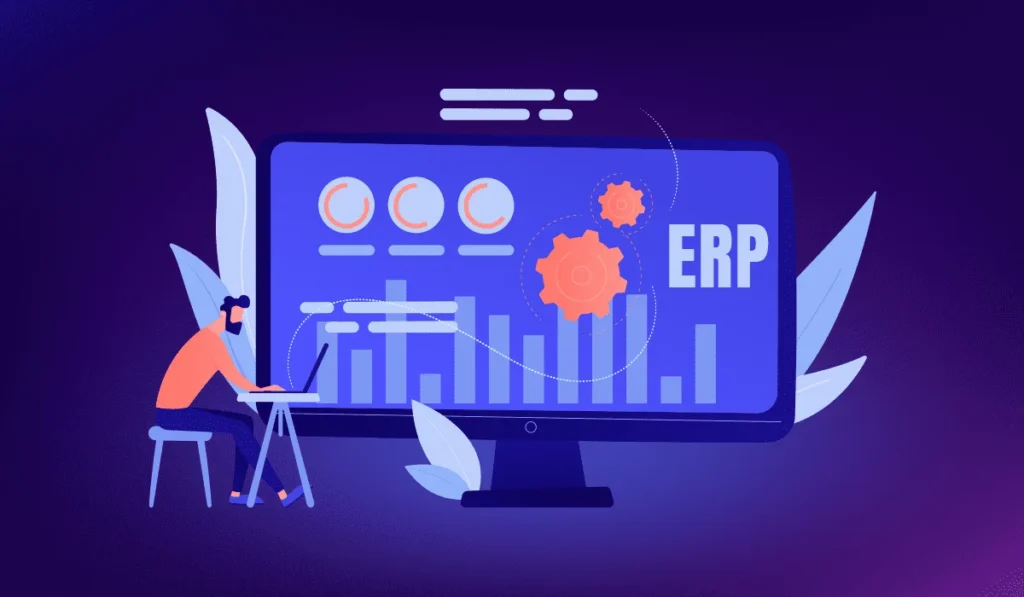In the dynamic world of modern business, the quest for efficiency and maximizing profitability is a perpetual goal.

The Future of Queue Management Systems

In the dynamic world of modern business, the quest for efficiency and maximizing profitability is a perpetual goal.
Imagine if there were a single solution that could streamline your operations, cut costs, and boost your returns on investment simultaneously.
And here comes the Enterprise Resource Planning (ERP) system, an essential tool in achieving this objective.
By integrating various departments and functions into one cohesive platform, ERP software has revolutionized how different business enterprises manage their work.

Content Index
Now, let’s talk about enhancing profit with ERP systems. We’ll also explore some cost-reduction strategies that will assist you with ERP.
But before that, what exactly is ERP?
ERP stands for Enterprise Resource Planning, an umbrella term encompassing a set of software applications designed to streamline and integrate various business functions.
These functions typically include Finance and Accounting, Supply Chain Management, Human Resources, Manufacturing, and finally, Customer Relationship Management.
By integrating these essential functions ERP eliminates data silos and promotes cross-departmental collaboration in a better way.
This integration also facilitates informed decision-making, process automation, and real-time visibility across the enterprise.
In a way, we can understand it as the proper way of planning and utilizing your business resources.
While thinking about implementing ERP, we cannot ignore today’s competitive surroundings that pressure businesses to do more with less.
And with this comes the need to address Cost Management in a broad perspective.
For this, you have to understand the significance of cost reduction and increasing ROI in business.
In the world of business, success is frequently based on profitability.
While revenue generation is significant, it is also critical to think about managing expenses and maximizing Return On Investment (ROI).
Cost reduction and ROI improvement work hand in hand, paving the road for financial stability, growth, and long-term sustainability of your firm.
Cost Reduction is the basic foundation for financial stability.
Cost reduction involves identifying and eliminating unnecessary expenditures, streamlining processes, and negotiating better deals with clients.
By minimizing costs, you can conserve resources, improve efficiency, and enhance your company’s profits.
This, in turn, leads to a stronger financial status, enabling your firm to withstand economic downturns, invest in growth initiatives, and provide better returns to shareholders.
The ROI Enhancement is a required measure for business effectiveness.
ROI measures the profitability of an investment relative to its cost.
A high ROI indicates that the investment your company made is generating a significant return, while a low ROI suggests that the investment is not earning sufficient returns.
So while investing, you can seek advice from others and should have a clear-cut understanding of the projects and revenues of your firm.
Enhancing ROI is a critical objective for businesses, as it directly impacts the financial well-being of the business.
By increasing ROI, companies can maximize the value of their investments, leading to improved profitability, increased market share, and a stronger competitive advantage.
Cost reduction and ROI enhancement are two interconnected ideas that cannot be separated. Your company’s success relies heavily on increasing ROI and cost reduction measures.
When your business reduces costs, it frees up resources that can be reinvested in higher-gaining projects, thereby boosting ROI.
Increasing ROI frequently results in increased income, which allows your organization to afford additional expenses and creates a positive feedback cycle.
The implementation of an ERP system can yield significant cost savings and ROI improvements for businesses.
Here’s how you can enhance your profit with an ERP system:
Organizations face multiple challenges in managing huge amounts of data across multiple departments and processes.
This approach often leads to inefficiencies, inconsistencies, and a lack of visibility into the overall work of the organizations.
With ERP, firms can accurately manage data with little hassle. It is the main and significant advantage of using ERP.
By streamlining Business Processes, the ERP makes sure that there is an efficient and optimized flow of activities and information in your organization with precision.
It comes up with a secure platform that integrates and automates a wide range of business operations across departments, reducing redundancy and streamlining workflows.
This automation process eliminates manual activities, decreases human error, and speeds up operations, resulting in considerable cost savings and enhanced efficiency.
It will help you analyze the data, organize the reports, and make informed decisions.
A successful installation of ERP systems will provide you with real-time data, through which you can easily and accurately track your business operations.
The real-time visibility into inventory levels enables your business to accurately track stock movement, identify stockouts, and optimize procurement processes.
This enhanced inventory management reduces carrying costs, prevents stockouts and overstocks, and ensures timely fulfillment of customer orders.
It provides a secure platform for your company to manage your products without losing the quality.
With successful updations, you can plan your future productions and timely distributions.
Customer satisfaction is also kept in check while managing production and distribution.
A successful installation and implementation of ERP in your business can help you in many ways.
The ERPs can provide you with data in real time, enabling you to make decisions about cost management.
It allows your company to improve production, procurement process, and staff allocation by providing accurate data and financial reports.
Planning and installation of ERP during the initial phase of your company can help you increase ROI.
ERP Systems optimize resource allocation, streamline supply chain operations, and eliminate unnecessary expenses.
By automating tasks, reducing errors, and improving efficiency, ERP systems directly contribute to lower operational costs, improving the overall profitability of your business.
Human beings are not perfect, they tend to make errors. This leads to overworking and other issues within the firm.
However, a successful installation of ERP can be advantageous in reducing data silos and managing the work-life of your employees.
It can help you with finances, human resources, and production.
It uses standardized procedures and reduces manual data entry, helping to minimize errors.
This leads to fewer mistakes in orders, shipments, invoicing, and other critical processes, reducing the need for costly rework and improving overall accuracy.
With real-time financial reports about the business, you can be informed about your company’s financial status.
With an accurate awareness of your business money, you can come up with plans to improve overall efficiency and success.
ERP systems provide a centralized source of accurate and up-to-date data.
This allows you to make informed decisions for your company based on real-time insights.
The data-driven strategy improves strategic planning, resource allocation, and risk management, resulting in better company outcomes.
Improved decisions can lead to an increase in ROI and a reduction in cost.
These are crucial aspects of business operations.
It enables your company to make informed decisions, optimize operations, and achieve strategic goals.
Through the statistical data produced by ERP, you can gain insights into demand trends, market fluctuations, and internal resource utilization.
This enables proactive decision-making and improved efficiency across the entire manufacturing process.
ERP systems use historical data, market trends, and external factors to generate accurate demand forecasts.
These forecasts serve as the foundation for inventory planning, ensuring optimal stock levels to meet customer demand without causing excessive shipping costs or stockouts.
The impact of ERP extends to sales and customer retention, along with growth and fostering long-lasting customer relationships.
ERP System provides consolidated customer data, providing a holistic view of each customer’s behavior, interactions, purchase patterns, and preferences.
The sales department of your company can customize strategies with this data, providing offers and personalized recommendations that boost client happiness and raise the sales rate.
The ERP system also helps with orders and fulfillment, ensuring timely delivery and resolving issues promptly.
Customer trust and loyalty are increased as a result of this responsiveness, which reduces loss and boosts long-term relationships in business.
Cost reduction and ROI enhancement are not just financial exercises, they are essential strategic imperatives for your business success.
Implementing an ERP solution can assist your company in dealing with the complexities of today’s corporate world.
It can help your business achieve long-term sustainability by providing better decision-making capabilities.
The discussed cost-reduction strategies with ERP can definitely help your firm in the long run.
By taking a budget-conscious approach and implementing ROI-oriented strategies, your business can achieve financial stability without much pain.
If you wish to read more about ERP System in detail feel free to go through our following blogs where we have covered all aspects you need to know!
Great! What’s the single biggest challenge you’d like a software solution to solve for your business? 🎯
💡 Suggested Solution Ideas:
Just one more step! Share your details so our experts can connect with you personally and discuss tailored solutions. 🤝
Thank You for Connecting! 🎉
We've received your information and a specialist will be in touch with you very shortly to discuss how we can help your business thrive.
In the meantime, feel free to browse our resources or reach out if you have immediate questions.
Understood! 🙏
No worries if you're not exploring software solutions right now. Our door is always open if your needs change!
Feel free to explore our other offerings or connect with us anytime.